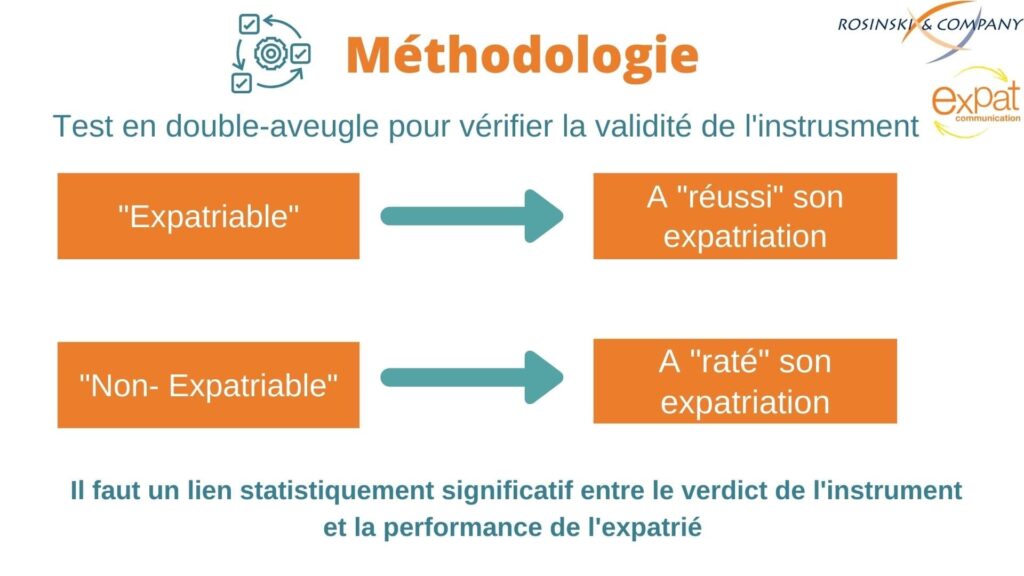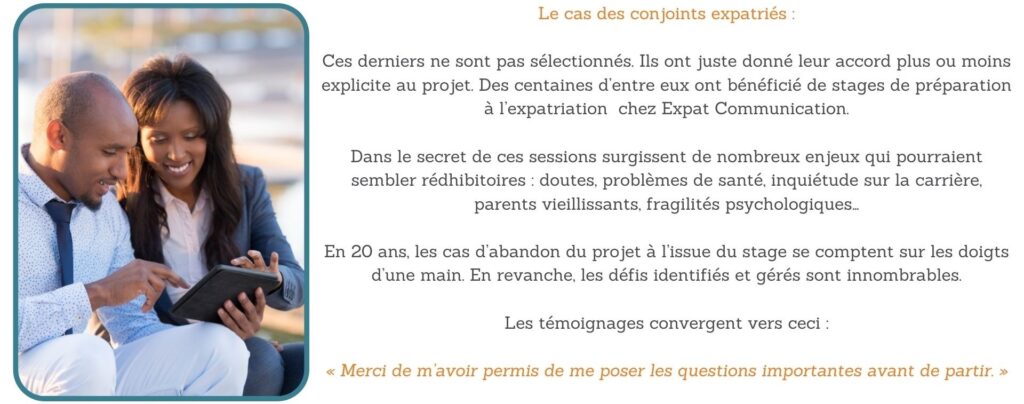HR friends, let's dream for a moment.

Let’s imagine that there is an indisputable tool that would subject employees to a battery of tests whose output would be “expatriable” or “non-expatriable”. Or even conclude “ok for Japan”, “doubtful for China”, “incompatible with the US”. Or at least, who could issue a “warning about adaptation, psychosocial risks, or doubts about the family’s integration
In short, let’s dream of a tool that would allow us to avoid these expatriation casting errors, which can be so costly for the company. On January 21, 2021, at Expat Communication, a workshop brought together some fifteen international mobility managers around the expertise of Philippe Rosinski, world-renowned master coach and pioneer of intercultural coaching.
We spent two hours discussing the following topics:
- Can expatriability really be measured?
- What is expatriability?
- What if the most pragmatic approach was to develop expatriation-related skills for expatriates and their families rather than assessing them?
Here is a summary of this reflection and its practical conclusions.
01
Practices and doubts of the companies present
The participants spontaneously mentioned the support and preparation programs for expatriation that they put in place. But when we focus on evaluation tools, then only one of them has undertaken to put a device in place. Many explain that they are looking for a way to reduce the risk of error. But very quickly in the discussion, doubts and obstacles arise.
- What about the RGPD? Who would administer this sensitive data? Who would communicate them to the expatriate? Where would they be stored?
- What to measure? Depending on the type of mobility, contract, hierarchical level and destination, the issues will vary. How do we include the family as an essential variable in the equation?
- On the borderline between “talent development” and “international mobility” services, how would such a service be structured? Who would pronounce the fatal “not suitable”, quite different from the classic “not selected”. Some even consider this approach unnecessary: “At this stage, the employees all have solid international experience, so there is no longer any risk. But those who send more junior employees or in more complicated contexts cannot be satisfied with this assumption.
02
Methodological detour: could we create a tool to measure expatriability?
In order to bring order to a complex reflection, we called upon the expertise of Philippe Rosinski, himself a designer of an intercultural evaluation tool.
What would it take to validate the expatriation in an irrefutable way?

A double-blind test should be constructed. It would be verified that the test declares “expatriates” succeed and that those classified as “non-expatriates” fail in their expatriation. If these two conditions are met then the instrument can be considered valid.
But the first question is: what do we mean by “successful expatriation” and how do we measure this success?
- Completing the expatriation?
- Fulfilling the mission objectives?
- Being satisfied with the experience?
The very purpose of the test is extremely complex.

In addition, too many external factors influence the outcome. Quality of preparation, reception arrangements, clarity of the mission, elements related to the company, the market and the country… Isolating the influence of the expatriate’s intrinsic qualities is complex.
Finally, and here we move from a scientific approach to a central postulate of coaching, the performance and posture of a collaborator depend on the context. They are dynamic and can reveal themselves over time and according to the environment. Measuring it at a given time in a given place does not prejudge what might happen, especially in a different country!
Conclusion confirmed by a very experienced international mobility manager: “With experience, some people are identified as ‘fragile’ and yet do very well and vice versa”..
03
If you can't really measure, how do you select?
While it is complicated to measure scientifically, it is essential to select candidates. So what criteria and process should we use?
One of the speakers explains in a very pragmatic way “like everyone else, we pass batteries of tests, which we finally qualify with our feelings, our common sense and our experience. “We are far from the all-powerful tool of the introduction but in the reality of the field.
In most companies, it is the talent that assesses the potential and the selection is made on the basis of management capabilities. However, very few of them measure “expatriability” at a later stage, or even at the same time, i.e. the ability to carry out one’s mission in another country.
Another position would be: since an assessment of expatriability by tests is too complex, let us proceed in a transparent way. Let’s discuss the issues together; let’s identify the challenges with the employee, and ideally with his/her spouse. In light of the results, we conclude together on the expatriability of the family and put in place the appropriate development plans. No one has an interest in a failure, neither the expatriate nor the company. We can even venture a third and more radical position: in the end, any person who wishes to do so and who has the skills to fulfill his or her mission can be an expatriate, provided that the stakes are well identified and that the person is accompanied. A postulate that may seem extreme but that we verify daily at Expat Communication with the case of expatriate spouses.

04
From selection to support
Under these conditions, the accompaniment to the departure becomes clearer. It is a question of giving each person selected for their skills the means to succeed in their mission in a new context in which their integration capacities are unpredictable but developable. What devices should be put in place? Each company has its own checklist, depending on its own business/trade/country issues.
The issues can be classified into three families:
- Clarity of missions and the “moral contract of expatriation”. This first point, often overlooked, is fundamental. The gains to be expected for the employee in financial terms but especially in terms of career must be clearly established. As the expatriation barometer proves, expatriates’ satisfaction is not so much linked to packages as to a transparent vision of the long-term benefits of expatriation. Career and financial gains are not assured. The main benefit of expatriation lies in personal and family development.
- Personal and family issues: in this area, the company relies on discussion with the employee and often on external providers. The conditions for the effectiveness of this approach: transparency of the diagnosis guaranteed by trust and by the confidentiality of exchanges, then empowerment through the development of action plans and the transmission of resources to future expatriates.
- Intercultural issues that we will develop further.
05
Focus on a challenge: intercultural coaching

Philippe Rosinski then developed the approach that led him to invent intercultural coaching and its assessment tool, the Cultural Orientations Framework.
After briefly recalling the objectives of intercultural coaching :
* Enable us to work more effectively across cultures (not just in the international sense)
* And more fundamentally: a more creative and complete form of coaching
Philippe Rosinski proposes a definition of the culture of a group as the set of characteristics, often implicit, that distinguish its members from another group. In particular, culture is based on a complex set of basic, largely unconscious values and assumptions.
The approach he has developed, based on the work of many interculturalists, leads to the grouping of these characteristics into a limited number of intercultural orientations. His tool then allows everyone to position themselves on these dimensions represented in the form of axes. This approach gradually draws a map that allows everyone to navigate more consciously in intercultural terrain. This makes it easier to successfully manage cross-cultural interactions. We can clearly see the difference here between a classic selection approach that deduces cultural orientations from behaviors (more or less valid depending on the country), and this more transparent approach that learns to identify cultural issues in order to manage them.
This leads logically to the idea of intercultural intelligence, a key skill for the expatriability of employees and their families, linked not only to formal knowledge of the local culture but above all to a good knowledge of oneself and one’s values. This approach was widely shared by the participants, almost all of whom have implemented intercultural programs. It remains to be seen whether it is a question of training or coaching, i.e. transmission of knowledge or transformation of the way of interacting. Each of these approaches has its advantages depending on the objectives.
In the end, in two hours, we accomplished an efficient path that led us to abandon the idea of scientifically measuring expatriability in favor of open reflection with the expatriate and his or her family, and programs to develop key competencies including intercultural intelligence.
06
Toolbox
- To evaluate the stakes of expatriation before the decision to leave: Decision support coaching
- To prepare one’s personal and family action plan before leaving, once the decision has been made: Mon projet en expatriation, collaborators or spouses programs.
- To develop intercultural intelligence, “intercultural intelligence” coaching for the employee/couple or family. One day and two follow-up sessions.
- To deepen Philippe Rosinski‘s approach and learn more about the COF, a 3-day masterclass on March 23, 24 and 25, 2021.
Expat Communication
Expert in interculturality and coaching
for international talent since 2001.









